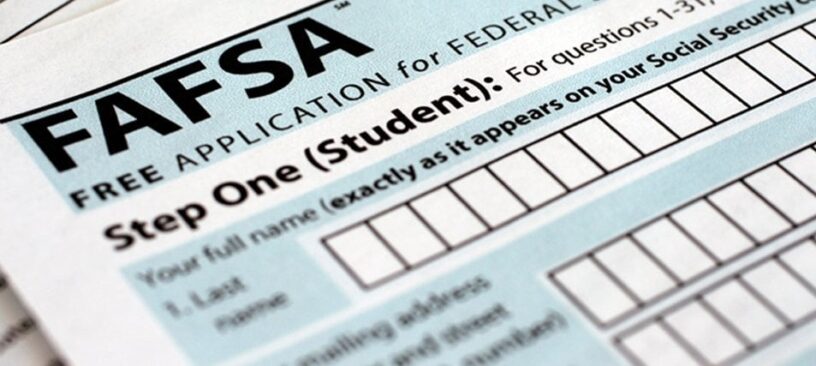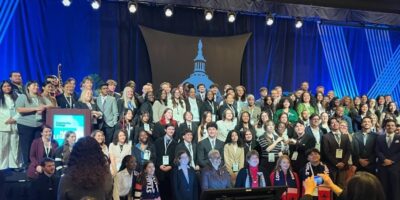By Lane A. Glenn, Femi Stoltz, and Andy Vargas
Note: This article appeared in the December 3, 2023 issue of Commonwealth Beacon and the December 10, 2023 issue of the Eagle Tribune.
At a time when the Massachusetts workforce needs more college degree holders more than ever, thousands of high school graduates aren’t showing up on college campuses, while leaving behind nearly $50 million in free federal financial aid each year.
We can take one simple yet effective step to turn this troubling trend around: Make completion of the Free Application for Federal Student Aid (FAFSA) a requirement for high school graduation in the Commonwealth. The FAFSA is necessary to determine whether a student is eligible for a variety of federal and state financial aid, as well as scholarships that may be available from colleges, foundations, and other organizations.
Massachusetts is widely recognized as the most educated state in the nation: Nearly half of adults in the state over the age of 25 have a bachelor’s degree or higher. While our workforce continues to demand more college educated people, times are changing, and we’re no longer keeping up. In a recent report, “Sizing Up Massachusetts’ Looming Skilled-Worker Shortage,” the Massachusetts Institute for a New Commonwealth (MassINC) predicts the state is going to be nearly 200,000 college-educated adults short of the workforce needed by 2030.
Even as employers and policymakers strive to create more opportunities for people without four-year degrees, the fact remains that the bachelor’s degree, for most people, is still the best path to job security, higher wages, better benefits, and a healthier, even longer, life.
Not nearly enough of our high school graduates are continuing their education in college, and soon, we will be lagging behind states like Colorado, Maryland, Connecticut and New Jersey that are taking more aggressive steps to encourage their residents to complete college degrees. The Hildreth Institute recently released a sobering study, “Seizing the Opportunity: Reversing Enrollment Declines in Higher Education,” that illustrates the scale of the problem we are facing in Massachusetts:
- Even as high school graduation rates have been improving over the last ten years, fewer grads are going directly to college: The rate plummeted from 73% in 2016 to 63% in 2021.
- The students who would most benefit from attending college are even less likely to go, with the rate for Black students falling to 56%, low-income students 45%, and Hispanic students 39%.
Requiring FAFSA completion of graduating high school students would immediately open the door for more students to get back on a college track who may have thought the cost of attending was out of reach: According to the National College Attainment Network, seniors who complete the FAFSA are 84% more likely to enroll in college; and the lowest income students, which include large proportions of Black, Hispanic, and rural students, are 127% more likely to enroll.
FAFSA completers are also more likely to persist in college and graduate, leading to those better jobs, security, wages, benefits, and health outcomes, while contributing to the needs of the Massachusetts workforce.
According to the National FAFSA Tracker, the completion rate for Massachusetts this year is 61%, which is higher than the national average of 54%. However, in states like Louisiana, Texas, and Illinois that now require FAFSA completion for high school graduation, 70% or more of their high school graduates are completing the FAFSA.
Even here in Massachusetts, our 61% average is misleading: As data from the United States Department of Education illustrates, in educated, mostly White communities with higher median incomes, more than 80% of high school students complete the FAFSA, and, not coincidentally, according to the state’s Department of Elementary and Secondary Education, 80% or more also attend college.
Meanwhile, in Gateway Cities with lower levels of education and income and more Black and Hispanic residents, less than 50% of high school students complete the FAFSA and, not coincidentally, 40% or less attend college.
Louisiana was the first state in the nation to require FAFSA completion for high school graduation in 2018, and they now lead the nation with FAFSA completion, with 74% of high school students filling out the form (even states requiring completion typically offer an option for families who want or need to opt-out). They have also closed the gap in FAFSA completion between low-income and high-income school districts.
Thirteen other states have now adopted some kind of universal FAFSA policy, and Massachusetts must join them: for the good of our students, to create more equitable opportunities among our communities, and to provide for our workforce needs.
Lane A. Glenn is the President of Northern Essex Community College. Femi Stoltz is the Massachusetts Policy Director at uAspire. Andy Vargas is the Massachusetts State Representative for the 3rd Essex District.






